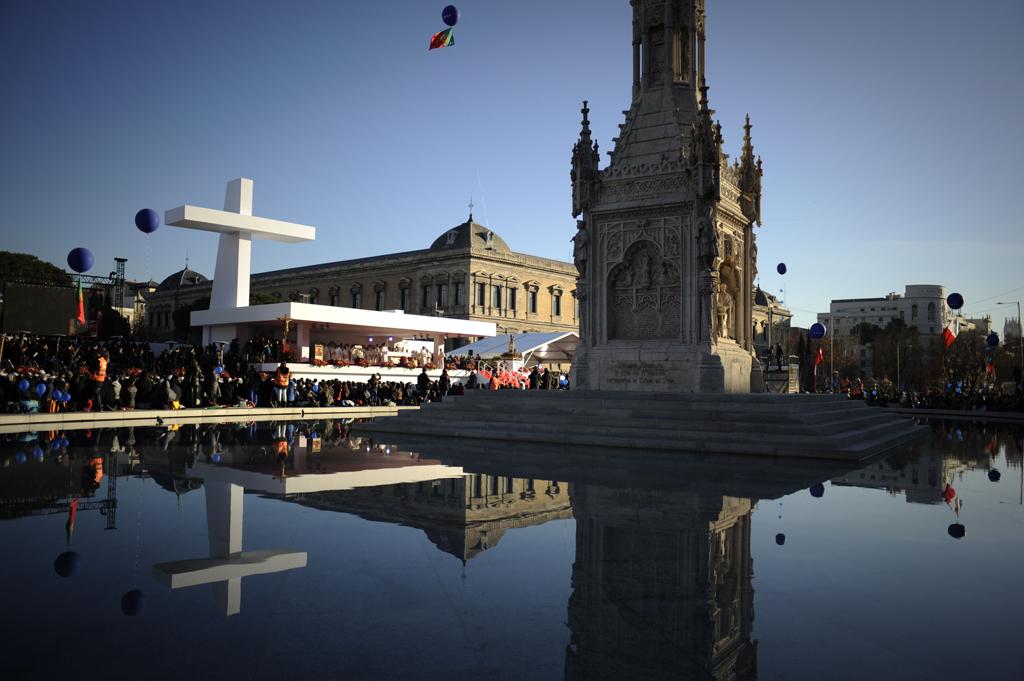Opinion: What history can teach us about the global economic crisis
General view of people taking part in a Catholic mass in central Madrid on Dec. 30, 2011.
BOSTON — Can the United States blame its dysfunctional government and irreconcilable political differences on the 17th century?
And I have heard it said that the roots of Europe’s financial crisis also go back that far. Is history destiny, and our fate determined by unresolved conflicts of long ago?
Some say that, at heart, the euro crisis is a result of differences in the way Catholic and Protestant countries do business. The 30 years war (1618-1648) that pitted Catholics against Protestants, essentially ended the Holy Roman Empire, although it dragged on for a while. The Treaty of Westphalia in 1648 ushered in the concept of the modern nation state.
“But what remained unchanged from those times,” according to Wolfgang Munchau, writing in the Financial Times, “are the underlying cultural conflicts between Protestants and Catholics, north and south …”
He might have added that the euro crisis came only after the formation of the European Union, which, in a sense, sought to undo Westphalia by submerging national sovereignties in the name of a greater entity — a Wholly Brussels Empire, if you will.
If you lump the Greek Orthodox into the Catholic camp, you might make a case that the euro crisis is a split between the so-called “Protestant ethic” of hard work and delayed gratification in the wintery north, versus the more easy going, care-free and profligate ways of the sunny Catholic/Orthodox south.
Is it mere coincidence that the nine countries recently down-graded by Standard & Poor's are predominantly Catholic? It seems to me there are too many Catholics in Germany, which is setting the rules for avoiding moral hazards, to blame profligacy on the Church of Rome.
So is it then a matter of north versus south? If so how do you explain Ireland’s financial troubles being firmly anchored in the North Atlantic?
As for the United States, one could trace our political deadlock today directly back to the 17th century English Civil War (1641-1651). As Kevin Phillips argues in his “The Cousins’ Wars” much of Oliver Cromwell’s support was centered in East Anglia which represented the new and growing power of industry and commerce against the old land-owning, aristocratic order that remained loyal to King Charles I. Cromwell represented new ideas, creative destruction, as he might have called it, while the Royalists clung to tradition. East Anglia was also influenced by immigration and new thinking from the continent, mainly from Holland.
New York was settled by the industrious Dutch, and New England largely by people from East Anglia. Indeed, half the graduates from the newly minted Harvard College sailed back to England to fight on Cromwell’s side.
By the 19th century the industrial North was much more influenced by immigration from Europe than the still rural South — not counting slaves, of course, who came against their will. You have only to compare the homesteads of the Virginia Jeffersons to the more humble abodes of the Massachusetts Adamses to see that the aristocratic impulses of Royalist, 17th century England lived on more in the South than the North.
The American Civil War, according to Phillips, was in some ways a replay of the earlier, unresolved conflicts of 17th century England, pitting the rapidly industrializing North against the rural, land- (and slave-) owning South.
Southerners in our Civil War identified with the English Civil War Royalists. A British observer, James Garnett, later to become Field Marshal Vicecount Wolseley, wrote that Confederates kept asking him: “Why England had not recognized their independence … Had we no sympathy for the descendents of our banished Cavaliers? Was blood not thicker than water?” Cavaliers was what the Royalists called themselves, and Confederate cavalrymen followed suit.
Or as Member of Parliament John Roebuck put it: “The North will never be our friend. Of the South, you can make friends. They are Englishmen, not the scum and refuse of Europe,” which, in Roebuck’s view, were filling the ranks of the Union Army. According to Amanda Foreman, in her book “The World On Fire,” Roebuck feared the modernizing, democratizing tendencies that he saw in the Union cause — not unlike what the Royalists saw in Cromwell’s cause.
If you want to indulge the parallel further, you might say that, although the old Confederacy has metastasized beyond its original borders, the conservative values of the old South, the fear of foreign immigration and foreign influences, the fear of changing cultural norms, live on in the Republican Party of today. Notice how President Obama is always being criticized for being too influenced by European values? Democrats, in Republican eyes, want to indiscriminantly tear down old values as Cromwell tore down churches.
Historical determinism taken to ridiculous lengths? Of course, but neither nations nor individuals ever completely escape their pasts.
Our coverage reaches millions each week, but only a small fraction of listeners contribute to sustain our program. We still need 224 more people to donate $100 or $10/monthly to unlock our $67,000 match. Will you help us get there today?
